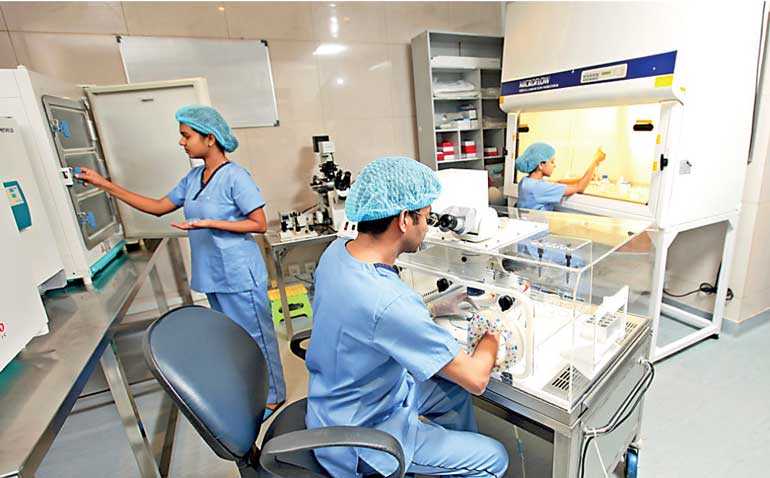Thursday Feb 19, 2026
Thursday Feb 19, 2026
Wednesday, 16 October 2019 00:00 - - {{hitsCtrl.values.hits}}

Lanka Hospitals, the internationally accredited multiple award-winning healthcare provider, reached another milestone recently with the introduction of Pre-Implantation Genetic Testing (PGT), an advanced technology for the detection of genetic diseases in embryos during IVF treatment.
The technology is useful for couples who choose to conceive through IVF and wish to identify the presence of genetic diseases within the embryo prior to implantation. The technology is a new service offered by Lanka Hospitals’ Fertility Centre which has set several benchmarks in the sub-fertility field in Sri Lanka such as the delivery of the first pregnancy through vitrification and high pregnancy rates with blastocyst transfers.
The centre has also implemented novel investigations such as Reactive Oxygen in Semen (ROS) and sperm DNA fragmentation analysis to identify male factor infertility in order to increase the chance of conception. PGT is the new service offering which enables embryos to be checked for a wide range of genetic disorders such as Down Syndrome, Haemophilia and Thalassemia before being transferred into the womb.
“The PGT technology offered by Lanka Hospitals’ Fertility Centre will have a profound impact on our society as it would offer couples the support they need to conceive healthy babies. PGT will make a positive contribution to families and ensure the health and well-being of children,” Lanka Hospitals Group Chief Executive Officer Dr. Prasad Medawatte stated.
Lanka Hospitals’ Fertility Centre offers two types of genetic testing during IVF treatment. These are pre-implantation genetic testing for aneuploidies (PGT-A) and pre-implantation genetic testing for monogenic disorders (PGT-M). Pre-implantation genetic testing for chromosomal structural rearrangements (PGT-SR) will be implemented at later stages.
Lanka Hospitals has installed a state-of-the-art dynamic laser system with digital imaging to perform embryo biopsy and other techniques such as zona thinning and assisted hatching. “The goal of PGT-A is to identify embryos with trisomy such as Downs Syndrome. Furthermore, to identify gender for sex chromosome linked diseases.
“This will enable us to select the healthy embryo leading to a healthy pregnancy. Meanwhile PGT-M is to identify a pregnancy that is unaffected by specific genetic disorders inherited through carrier parents. This test is important for patients who are carriers of single gene disorders such as sickle cell disease or thalassemia. PGT-M makes it highly likely that the baby will be free of the disease,” Lanka Hospitals’ Fertility Centre Clinical Embryologist Dr. Madara Ralapanawe stated.
“PGT is ideal for couples that have experienced multiple failed IVF cycles, recurrent miscarriages, who are known carriers of a genetic disease or who have a child with a genetic disease. The tests carried out with the use of PGT will help identify the embryos that are most suitable for transfer during IVF and offer the best chance of implantation and ultimately successful pregnancy,” Lanka Hospitals Consultant Obstetrician and Gynaecologist Dr. Nishendra Karunaratne stated.
Lanka Hospitals is the first hospital in Sri Lanka to be awarded some of the most prestigious accreditations in the world for its healthcare service standards including the sixth edition of the Joint Commission International (JCI) accreditation since 2014, and the world-respected Medical Tourism Certification from the Medical Travel Quality Alliance (MTQUA).
Furthermore, Lanka Hospitals Diagnostics (LHD) is the only Sri Lankan Laboratory to be accredited by the prestigious laboratory accreditation body, College of American Pathologists (CAP).